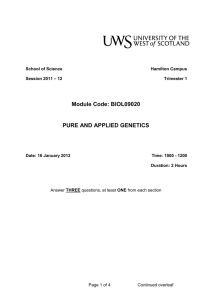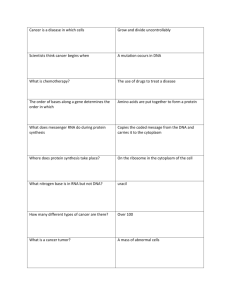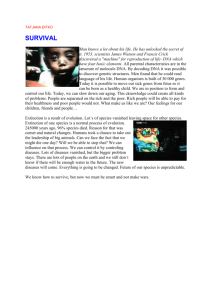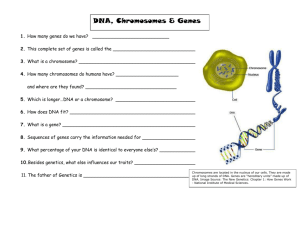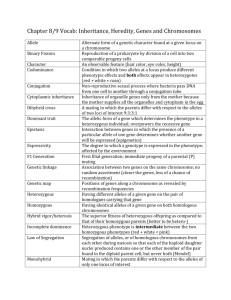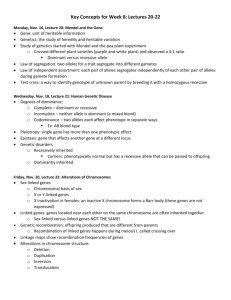Exam 3 Plant Genetics 430/530 2012
advertisement
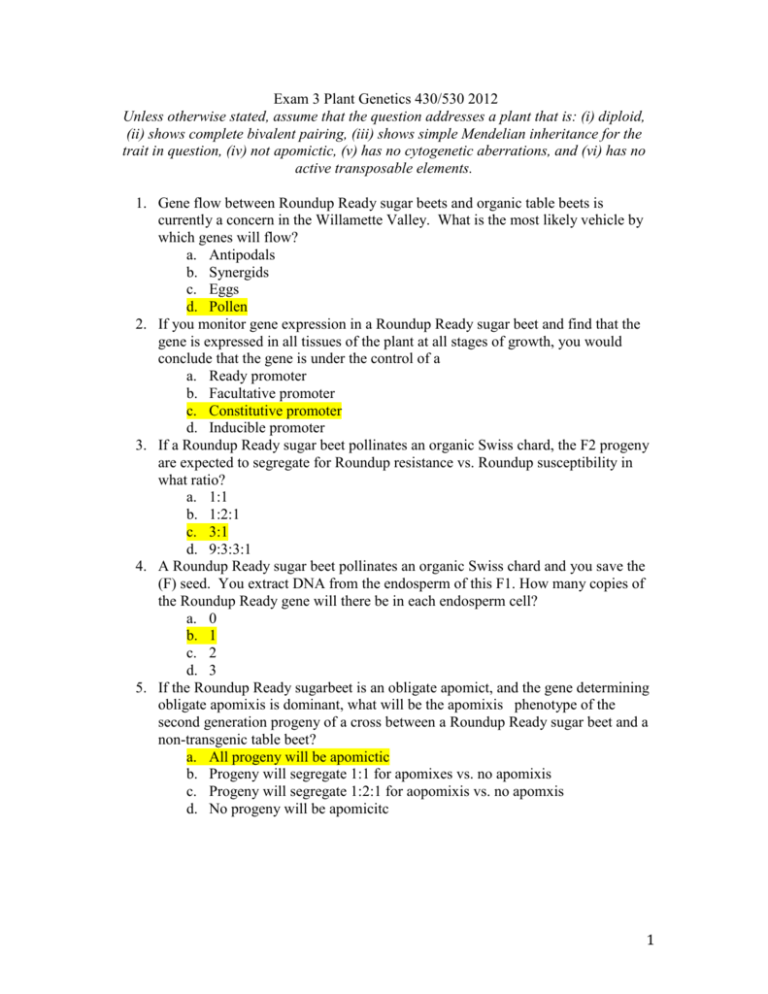
Exam 3 Plant Genetics 430/530 2012 Unless otherwise stated, assume that the question addresses a plant that is: (i) diploid, (ii) shows complete bivalent pairing, (iii) shows simple Mendelian inheritance for the trait in question, (iv) not apomictic, (v) has no cytogenetic aberrations, and (vi) has no active transposable elements. 1. Gene flow between Roundup Ready sugar beets and organic table beets is currently a concern in the Willamette Valley. What is the most likely vehicle by which genes will flow? a. Antipodals b. Synergids c. Eggs d. Pollen 2. If you monitor gene expression in a Roundup Ready sugar beet and find that the gene is expressed in all tissues of the plant at all stages of growth, you would conclude that the gene is under the control of a a. Ready promoter b. Facultative promoter c. Constitutive promoter d. Inducible promoter 3. If a Roundup Ready sugar beet pollinates an organic Swiss chard, the F2 progeny are expected to segregate for Roundup resistance vs. Roundup susceptibility in what ratio? a. 1:1 b. 1:2:1 c. 3:1 d. 9:3:3:1 4. A Roundup Ready sugar beet pollinates an organic Swiss chard and you save the (F) seed. You extract DNA from the endosperm of this F1. How many copies of the Roundup Ready gene will there be in each endosperm cell? a. 0 b. 1 c. 2 d. 3 5. If the Roundup Ready sugarbeet is an obligate apomict, and the gene determining obligate apomixis is dominant, what will be the apomixis phenotype of the second generation progeny of a cross between a Roundup Ready sugar beet and a non-transgenic table beet? a. All progeny will be apomictic b. Progeny will segregate 1:1 for apomixes vs. no apomixis c. Progeny will segregate 1:2:1 for aopomixis vs. no apomxis d. No progeny will be apomicitc 1 6. You read that wheat has maternal inheritance of organelles (chloroplasts and mitochondria). This means that androgenetic doubled haploid systems (e.g. anther culture) will not work for wheat since all doubled haploids will be albinos. a. T b. F 7. Gene “X” is 1 kb long. Three different single nucleotide polymorphisms in the gene are known to confer the same recessive phenotype. Only one DNA sequence confers the dominant phenotype. Given this information, how many different alleles at this locus are possible in a single diploid plant? a. 1 b. 2 c. 3 d. 4 8. Gene “X” is 1 kb long. Three different single nucleotide polymorphisms in the gene are known to confer the same recessive phenotype. Only one DNA sequence confers the dominant phenotype. Given this information, how many different alleles at this locus are possible in a single autotetraploid plant? a. 1 b. 2 c. 3 d. 4 9. Most polyploid plants are dioecious. a. T b. F 10. An F1 is heterozygous at a locus and the alleles at this locus show codominance. Expected monohybrid phenotypic ratios for the test-cross progeny and the doubled haploid progeny of this F1 plant are expected to be the same. a. T b. F 11. A transcription factor is a a. gene whose protein product regulates the expression of other genes b. signal for terminating synthesis of mRNA c. type of promoter used to visualize expression of transgenes d. special sequence in 18S rRNA 12. Chi square tests can be used to test hypotheses regarding the inheritance of alleles in diploids and in polyploids that show normal bivalent pairing. a. T b. F 2 13. In a chi square test for segregation of SNP alleles at a locus in a population of doubled haploids, you test for a 3:1 ratio and you calculate a chi square value of 10.7. a. You will accept the null hypothesis. b. You will reject the null hypothesis and the reason for rejection is that you chose the wrong ratio to test. c. You will reject the null hypothesis and the reason for rejection is that alleles at this locus show segregation distortion. d. You should never use a chi square test for molecular marker data. 14. If you expect a 9:3:3:1 ratio, how may df will you use for your chi square test? a. 1 b. 2 c. 3 d. 4 15. A genome is reported to be 5,000 Megabases in size. This means that a. There are 5,000 megabases of DNA in an unfertilized central cell b. There are 5,000 picograms of DNA in a haploid genome c. There are 5,000 megabases of DNA in a 2n leaf cell d. There are 5,000 megabases of DNA in a 1n pollen grain 16. A principal justification for sequencing the genomes of cacao and strawberry was a. Ownership of genes b. Determining the genome size c. Determining the number of linkage groups d. Making it more efficient to develop better varieties 17. The cacao and strawberry are similar in that they have approximately how many genes? a. 10,000 b. 20,000 c. 30,000 d. 40,000 18. Polyploids are always bigger and better than diploids and this is because they have more copies of each gene and all of these copies are expressed at the same time. a. T b. F 19. The ancestral and basal condition of angiosperm flowers is a. Dioecious b. Apomictic c. Hermaphroditic d. Self incompatible 3 20. Advantages of cross-pollination as compared to self-pollination include avoiding inbreeding depression. Inbreeding depression refers to a. Recurring depression from remaining indoors. b. Too much effort devoted to producing male plants. c. Phenotypes due to interaction between dominant alleles at different loci. d. Negative phenotypes due to homozygosity for deleterious recessive alleles. 21. Male sterility and self-incompatibility are mechanisms that promote crosspollination in a. Monoecious plants and plants with perfect flowers. b. Dioecious plants with defined sex chromosomes. c. Transgenic plants, where the transgenes are inserted in chloroplast genomes. d. Plants heterozygous for inversions. 22. The required readings on “dark matter” and “Mendelian puzzles” argued that noncoding (formerly known as junk) DNA is a. Actually coding for genes. b. Where 5’ and 3’ UTRs are found. c. Involved in aging. d. Involved in gene regulation. 23. The shortening of telomeres at mitosis is hypothesized to be related to aging. a. T b. F 24. The failure of centromere formation is what accounts for chromosome doubling in doubled haploid production and in the natural development of polyploids. a. T b. F 25. You meet a scientist who is an expert in analysis of exomes. Which of the following is this scientist’s area of endeavor? a. Characterization of telomere shortening b. Characterization of the expressed portion of genomes c. Understanding what happens to introns after they are removed d. Designing reporter genes 26. Pairing of homologous chromosomes occurs in a. Mitosis b. Meiosis c. Mitosis and meiosis d. None of the above 27. Pairing of homoeologous chromosomes occurs in a. Autopolyploids b. Allopolyploids, all the time, and leads to complete fertility c. Allopolyploids, rarely, and leads to sterility d. Diploids 4 28. If a plant that is 2n = 2x = 20 undergoes mitosis, the result will be a. 2 daughter cells, each 2n = 20 b. 4 daughter cells, each n = 10 29. If a plant that is 2n = 2x = 20 undergoes meiosis, the result will be a. 2 daughter cells, each 2n = 20 b. 4 daughter cells, each n = 10 30. Assuming bivalent pairing, if a plant is 2n = 4X = 40 undergoes meiosis, the result will be a. 2 daughter cells, each 2n = 20 b. 4 daughter cells, each n = 10 c. 2 daughter cells, each 2n = 40 d. 4 daughter cells, each n = 20 31. If a plant is 2n = 2x = 30, how many chromatids will be present in one bivalent? a. 1 b. 2 c. 3 d. 4 32. The random alignment of non-homologous chromosomes at which stage of meiosis accounts for independent assortment? a. Zygonema b. Pachynema c. Metaphase I d. Metaphase II 33. Independent assortment can be due to random alignment of non-homologous chromosomes and/or to a. Recombination between loci very close on the same chromosome. b. Recombination between loci far apart on the same chromosome. c. Frameshift mutations. d. Insertion of a transposable element into a promoter. 34. New combinations of alleles at linked loci arise through a. Mutation. b. Segregation. c. Independent assortment. d. Crossovers at Pachynema of meiosis. 35. If a plant is 2n = 20, and lots of marker data from a test-cross population of 94 plants are available, how many linkage groups (maps) would you expect? a. 5 b. 10 c. 20 d. 0, because linkage maps can only be made from doubled haploid populations. 5 36. Crossing over is the basis of linkage mapping. Which type of crossover will be most informative for map construction? a. Crossovers between sister chromatids b. Crossovers leading to duplications and deficiencies c. Crossovers between polymorphic loci d. Crossovers involving all four chromatids in the bivalent, at the same time 37. If two loci are at opposite ends of a linkage maps that is 200 cM long, you would expect to see independent assortment of alleles at these two loci. a. T b. F 38. Which of the following terms best describes linkage? a. Proportion of individuals in a population with the same allele that show the same phenotype b. One gene confers more than one phenotypic trait c. Two genes in close proximity on the same chromosome d. Two genes that interact e. Two genes with a single regulatory region 39. Which of the following terms best describes pleiotropy? a. Proportion of individuals in a population with the same allele that show the same phenotype b. One gene confers more than one phenotypic trait c. Two genes in close proximity on the same chromosome d. Two genes that interact e. Two genes with a single regulatory region 40. Which of the following terms best describes epistasis? a. Proportion of individuals in a population with the same allele that show the same phenotype b. One gene confers more than one phenotypic trait c. Two genes in close proximity on the same chromosome d. Two genes that interact e. Two genes with a single regulatory region 41. Crossing over is such a potent source of genetic variation because a. Crossovers involve the loss and addition of chromatin, and these mutations give rise to new alleles at each meiosis. b. Crossovers lead to frameshift mutations. c. Crossovers give new combinations of alleles at linked loci. d. Crossovers are the leading cause of polyploidization. 42. Given the following data from a doubled haploid population derived from the cross of TTYY x ttyy parents, it is obvious that the two loci can only be on separate chromosomes. TTYY TTyy ttYY ttyy 22 27 24 26 a. True b. False 6 43. Given the following data from a doubled haploid population derived from the cross of QQZZ x qqzz parents, the two loci are obviously on the same chromosome. QQZZ QQzz qqZZ qqzz 45 5 5 45 a. True b. False 44. In question # 43, what would be the estimated % recombination between the Q and Z loci? a. 0 b. 10 c. 20 d. 40 45. If you converted the percent recombination value in question #44 to centiMorgans (either Haldane or Kosambi), the centiMorgan value would be a. Lower than the % recombination value. b. About the same as the % recombination value. c. Larger the % recombination value. d. The Morgan value divided by the number of Mb. 46. In comparing linkage maps of the same chromosome in the same diploid species based on two different populations, which of the following is the most likely? a. Locus orders will the same but cM distances will vary b. Locus orders will be different but cM distances will be the same c. There will be no synteny. d. There will be complete homoeology 47. In comparing linkage maps of two homoeologous chromosomes in the diploid ancestors of an allopolyploid species, you would expect a. Complete or nearly complete synteny b. Evidence of inversions and translocations c. No, or very little, synteny d. Complete homology 48. The C value paradox refers to the finding that the more complex an organism is, the bigger its genome will be – in terms of both cM and Mbp. a. T b. F 49. In a deoxyribonucleotide, 5’ and 3’ refer to the a. start site for translation. b. start site for transcription. c. carbons where (respectively) the phosphate and hydroxyl groups are attached. d. carbons where (respectively) the pyrimidine and purine bases are attached. 7 50. DNA polymerase synthesizes new deoxyribonucleotide chains in which direction? a. 3’ to 5’ in the leading strand b. 3’ to 5’ in the lagging strand c. 5’ to 3’ in both the leading strand and the lagging strand d. 5’to 3’ in the leading strand and 3’to 5’ in the lagging strand 51. In higher plants, each chromosome has a single bidirectional origin of DNA replication located at a. the centromere. b. the promoter. c. the dark matter. d. none of the above. 52. Okazaki fragments are found on both leading and lagging strands. a. T b. F 53. Transcription of a transgene inserted into the nuclear genome occurs a. in the cytoplasm. b. in both the nucleus and cytoplasm. c. in the nucleus. d. at the ribosomes. 54. Messenger RNA (mRNA) can have informational, functional, and/or regulatory functions a. T b. F 55. The segment of a gene that would be most likely to have the sequence TATA ~ 30 bp upstream (5’) from the transcription start site is called a promoter. a. T b. F 56. The sequence of introns can be found a. in mRNA sequence. b. in genomic DNA sequence. c. in the primary amino acid sequence. d. In all of the above (a-c). 57. If there is a change in the promoter of a gene leading to a loss of the TATA sequence, this could lead to a recessive allele due to failure of transcription of the gene to a mRNA. a. T b. F 58. The synthesis of the mRNA stops when a stop codon is encountered. a. T b. F 59. The TGA sequence in sense strand DNA is diagnostic of a. a start codon. b. a stop codon. c. an intron/exon junction. d. a 3’ UTR. e. 8 60. Exons are a. always longer than introns. b. the most likely site of SSRs. c. removed during mRNA processing and then recycled. d. none of the above (a-c) 61. Translation of the mRNAs transcribed from the genes located on the 42 chromosomes of wheat, an allopolypoid, occurs in the cytoplasm. a. T b. F 62. Transfer RNAs (tRNAs) a. are very generic, with each tRNA able to carry at least five different amino acids. b. consist of 18S and 35S subunits. c. are coded for by sequences in introns. d. have anticodons that base pair with codons in mRNA. 63. In the process of translation, the ribosome moves 5’ to 3’ on the sense DNA. a. T b. F 64. If you know the amino acid sequence of a prion you can deduce the exact DNA sequences of the corresponding gene. a. T b. F 65. In “The gene for fragrance in rice” paper, the authors conclude that the functional basis for the difference between aromatic vs. non-aromatic alleles is probably due to a premature stop codon in the aromatic allele caused by a frameshift mutation. This causes aroma to be recessive and lack of aroma to be dominant. a. T b. F 66. In the case of partial dominance, heterozygotes cannot be distinguished from dominant homozygotes based on phenotype. a. T b. F 67. Molecular markers can show a. only codominance. b. only dominance. c. both dominance and codominance. 68. The situation where heterozygotes at a locus are most fit - e.g. they have the highest phenotypic value - is called: a. dominance b. underdominance c. overdominance d. codominance 9 69. Which of the following best describes restrictionendonucleases? a. Only make blunt cuts in single stranded DNA b. Only make sticky end cuts in single strand RNA c. Make cuts at ends of polypeptides d. make cuts at defined recognition sites in DNA 70. Restriction enzymes are useful only for Sothern blots; they are not useful for detecting polymorphisms using PCR. a. T b. F 71. Agrobacterium tumefaciens is the most common vector for maintaining and increasing the copy number of specific DNA fragments. a. T b. F 72. If a gene has introns, clones of this gene in genomic and cDNA libraries will be the same length. a. T b. F 73. Two principal modes of operation for molecular markers are a. duplication and deletion. b. promoters and terminators. c. amplification and hybridization. d. start and stop codons. 74. The primers that are used for a PCR reaction to amplify genomic DNA consist of a. Taq polymerase. b. Amino acids. c. Oligonucelotides. d. Dideoxynucleotides. 75. The temperature cycling used in PCR reactions is needed to alternately allow for double strand DNA denaturation, primer binding, and primer extension. a. T b. F 76. If you could easily determine the DNA sequence of alleles at 100 loci in one diploid plant that was heterozygous at all loci, how many different alleles would you be able to detect? a. 100 b. 200 c. 300 d. 400 77. If you could easily determine the DNA sequence of alleles at 100 loci in one triploid banana plant that was heterozygous at all loci, how many different alleles would you be able to detect? a. 100 b. 200 c. 300 d. 400 e. 10 78. Key considerations in Next-Generation, massively parallel, and high throughput DNA sequencing techniques (e.g. 454 and Illumina) are: a. How many sequencing gels a technician can run in a day b. Whether to use radioactively or fluorescently labeled dideoxynucleotides c. Whether to determine the DNA sequence in picograms or in Megabases d. Speed, read length, accuracy, and cost 79. In the strawberry genome sequence paper, the term “contig” refers to a. The sequence of a complete chromosome, except for the centromeric region b. The sequence of one read (e.g. ~ 100 nucleotides) c. The contiguous sequence of several overlapping reads of DNA sequence d. The n number of chromosomes in Fragaria 80. A molecular marker based on PCR primers for conserved regions flanking a region of variable length tandem repeats is called a simple sequence repeat (SSR). Note, this marker is also known as a microsatellite. a. T b. F 81. Marker assisted selection (MAS) is so popular with plant breeders today because a. it allows the breeder to select for traits that cannot be easily, or cheaply, selected based on phenotype. b. it allows breeders to immediately patent genes. c. it does not involve PCR. d. it relies exclusively on morphological markers. 82. Which of the following features best describes marker data based on nucleotidelevel polymorphisms in DNA, such as a SNP? a. Quantitative inheritance b. Qualitative inheritance 83. The alternation of generations does not occur in plants hemizygous for a transgene a. T b. F 84. One of the features of transgenic technology is that both prokaryotic DNA sequences (e.g. promoters, coding sequences, terminators) and eukaryotic DNA sequences can be “mixed and matched” to create constructs. a. T b. F 85. Reporter genes are included in transgenic constructs in order to a. enhance the level of expression of the transgene. b. limit gene expression to specific tissues. c. Genes that, upon expression in the transgenic plants, provide a clear indication that genetic transformation did occur, and indicate the location and the level of expression. d. ensure inducible expression of the transgene. 11 86. Selectable markers (e.g. antibiotic resistance genes) are added to transgene constructs a. to make plants resistant to bacteria b. to prevent the tissue cultures from becoming contaminated c. to facilitate selection of cells that incorporated and are expressing the transgene d. to protect intellectual property 87. How many primary endosperm nuclei (each of them “n”) are there in an embryo sac? a. 2 b. 4 c. 6 d. 8 88. If a Megaspore Mother Cell (MMC) has the genotype “AABBCC”, each of the four “n” cells resulting from meiosis will have a different genotype. a. T b. F 89. In a pollen grain, a. the mitochondria are all 3n. b. two of the nuclei will become sperms while the third will become the pollen tube. c. the three nuclei will fuse to give triploid endosperm. d. two of the nuclei will become tube nuclei while the third will become the sperm. 90. Which of the following combinations of characters might be most typical of a highly successful invasive species? a. Self incompatibility and non-bivalent pairing. b. Obligate apomixis and diploidy. c. Facultative apomixis and polyploidy. d. Vegetative reproduction via stolons and aneuploidy. 91. If a plant breeder is going to cross two genetically different varieties to study the genetics of a trait that is important in the endosperm, it does not matter which parent is used as the female. a. T b. F 92. If you used a molecular marker, such as the AFLP, to study genetic variation in domesticated garlic (which has not had sex in 10,000 years), what it the most likely expectation: a. Different samples of the same clone will show different patterns of AFLP bands. b. Different samples of the same clone will show the same pattern of AFLP bands. 93. Allopolyploids arise from a. Inter-specific hybridization b. Spontaneous doubling of the chromosome number 12 94. You are hired to breed seedless (3x) watermelons. Which of the following strategies is likely to be most successful and efficient? a. Self-pollinate resistant triploids. b. Cross unrelated triploids c. Select for unreduced gametes in triploids. d. Cross tetraploids with diploids to produce triploids. 95. If you double the chromosome number of a diploid banana species in order to create an autotetraploid, you would expect the plant to show sterility because of a. problems in mitosis. b. failure of spindle fibers. c. non-bivalent pairing leading to imbalanced gametes. d. induced cytoplasmic male sterility. 96. Spontaneous and induced chromosome doubling both result from altering the function of a. Spindle fibers. b. Telomeres. c. Centromeres. d. Nucleosomes. 97. If 2n = 6x = 42 wheat (AABBDD) is crossed with 2n = 2x = 14 rye (RR) and the F1 plant is doubled with colchicine, the F2 plants will be a. 2n = 42 b. 2n = 14 c. 2n = 49 d. 2n = 56 98. You compare two linkage maps. Each map is based on a different population of the same species. Population “A X B” is derived from “normal” parents. Population “C X D” is derived from parents homozygous for an inversion. a. Marker order will be the same in the two maps. b. Marker order will be the same but distances between markers will be different. c. Marker order will be inverted in C x D compared to A x B. d. None of the above. 99. In the “Mendelian puzzles” reading, the authors argue that most genetic variation in humans is due to genetic variation in exomes. a. T b. F 100. In plants there are examples of mutations showing qualitative inheritance that are of great importance in agriculture/horticulture. Which of the following is the best example of single genes conferring important phenotypes? a. Grain yield and baking quality in wheat. b. Aroma and flavor in hops. c. Shattering resistance and grain aroma in grasses. d. Apomixis in blackberries 13 Name: ________________________ 14


